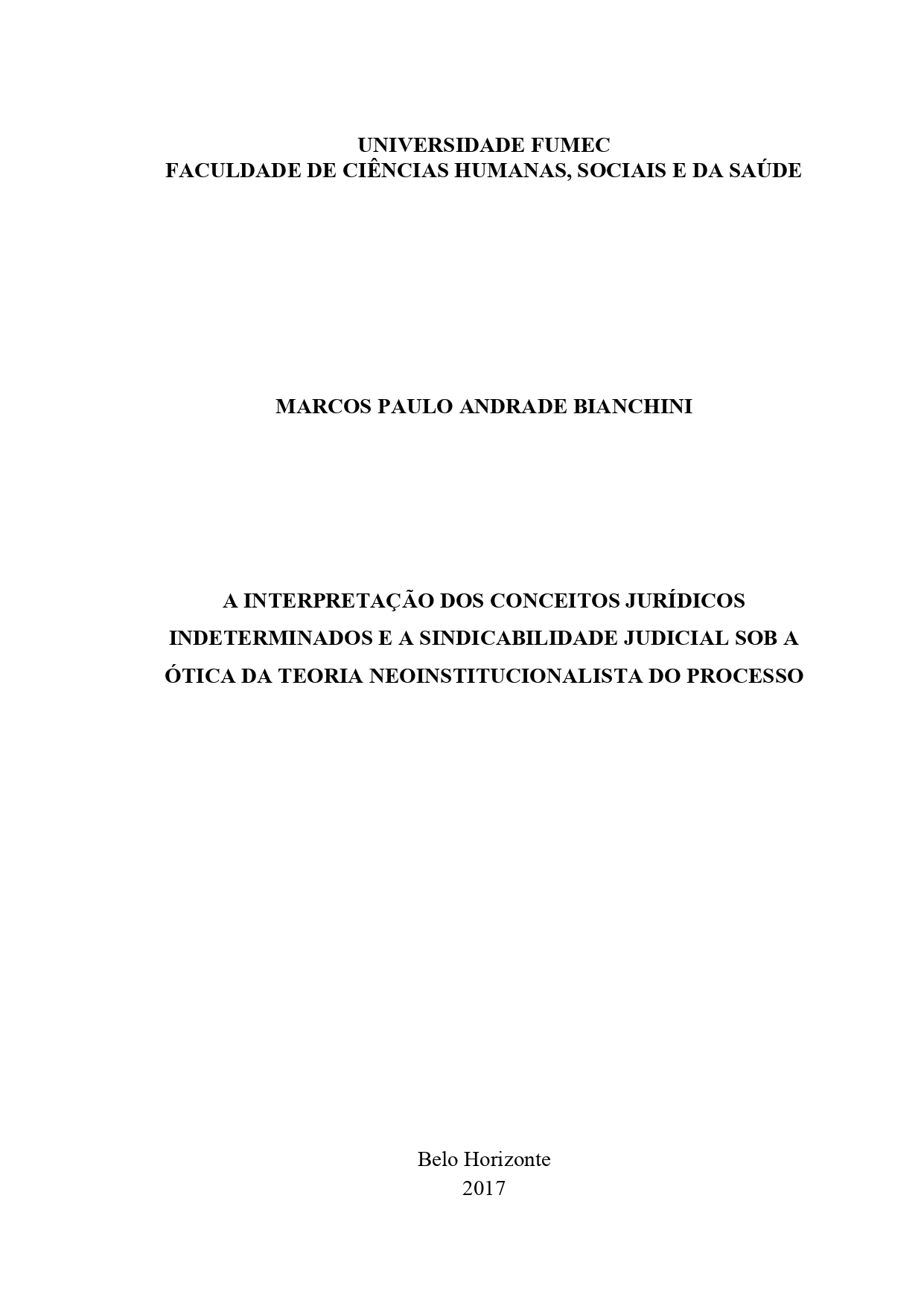A interpretação dos conceitos jurídicos indeterminados e a sindicabilidade judicial sob a ótica da teoria neoinstitucionalista do processo

Visualizar/
Data
2017Autor
Bianchini, Marcos Paulo Andrade
xmlui.mirage2.itemSummaryView.MetaData
Mostrar registro completoResumo
O estudo se propôs a pesquisar o controle judicial da interpretação administrativa dos
conceitos jurídicos indeterminados no Estado Democrático de Direito. Se pretendeu
aprofundar e tratar de forma crítico-reflexiva o exercício da interpretação dos conceitos
jurídicos indeterminados quando manejados pela Administração Pública por meio de uma
teoria democrática apta a prestar legitimidade à atividade administrativa nesse mister. Diante
disso, a pesquisa procurou responder a seguinte pergunta: o controle judicial que incide sobre
a interpretação administrativa dos conceitos jurídicos indeterminados permite a abertura da
interpretação à comunidade jurídica legitimada (povo), e tem conferido legitimidade aos atos
da Administração Pública? Partiu-se da premissa que há compatibilidade entre o princípio da
separação dos poderes (art. 2º, CRFB/1988) e o princípio da inafastabilidade da jurisdição
(art. 5º, XXXV, CRFB/1988), uma vez que tanto a Administração quanto o Judiciário estão
vinculados à juridicidade e é garantido ao cidadão se valer do processo como espaço críticoargumentativo para ver concretizados seus direitos fundamentais, que possuem características
de certeza, liquidez e exigibilidade. A pesquisa pertence a vertente sociológica-jurídica uma
vez que analisou, por meio de pesquisa jurisprudencial, como o Superior Tribunal de Justiça e
o Supremo Tribunal Federal tem concebido a diferenciação entre discricionariedade e
conceitos jurídicos indeterminados e a extensão do controle judicial dos conceitos jurídicos
indeterminados. Dessa maneira, compreendeu-se a teoria dos conceitos jurídicos
indeterminados à luz da teoria do conhecimento objetivo de Karl Popper e a teoria
Neoinstitucionalista do processo para propor uma teoria de decisão jurídica que seja
democrática e dotada de legitimidade, construída pelos legitimados à interpretação. Concluiuse que o cidadão, por meio do processo e seus princípios institutivos (contraditório, ampla
defesa e isonomia) e no exercício da hermenêutica isomênica, segundo a teoria
Neoinstitucionalista do processo, deve participar da interpretação das normas que possuem
em seu conteúdo conceitos jurídicos indeterminados. Se esta abertura não for oportunizada
pela Administração por procedimentos processualizados, o cidadão pode buscar a correção da
interpretação com o controle jurisdicional. The study aimed to investigate the judicial control of the administrative interpretation of the
indeterminate legal concepts in the Democratic State of Law. It was intended to deepen and to
treat in a critically-reflexive way the exercise of the indeterminate legal concepts
interpretation when managed by the Public Administration through a democratic theory apt to
lend legitimacy to the administrative activity in its duty. Therefore, the research sought to
answer the following question: does judicial control exercised over the administrative
interpretation of indeterminate legal concepts allow the interpretation to be opened to the
legitimate legal community (people), and has it conferred legitimacy on the acts of the Public
Administration? It was based on the premise that there is compatibility between the principle
of separation of powers (Article 2, CRFB / 1988) and the principle of inability of jurisdiction
(Article 5, XXXV, CRFB / 1988), since both the Administration And the judiciary are bound
to legality and it is guaranteed to the citizen to use the process as a critical-argumentative
space to see their fundamental rights materialized, since these have characteristics of
certainty, liquidity and enforceability. The study fits in the sociological-juridical aspect since
it analyzed, through a jurisprudential research, how the Superior Court of Justice and the
Federal Supreme Court have conceived the contrast between discretionary and undefined
legal concepts and the extension of judicial control of the indeterminate juridical concepts. In
this way, theory of indeterminate legal concepts was understood in the light of Karl Popper's
concept of objective knowledge and the Neoinstitutionalist theory of the process to propose a
theory of legal decision that is democratic and endowed with legitimacy, constructed by those
legitimated to the interpretation. It was concluded that citizen must participate in the
interpretation of the norms that have in their content indeterminate legal concepts, using the
process and its institutional principles (contradictory, ample defense and isonomy) and the
exercise of isomenic hermeneutics, according to the Neoinstitutionalist theory of the process.
If this opening is not authorized by the Administration by procedural procedures, the citizen
can seek the correction of the interpretation with the judicial control.
